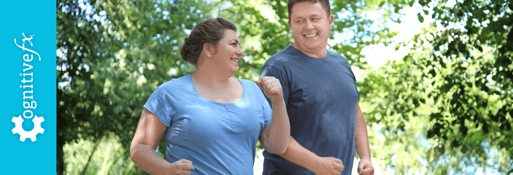“Eat right and exercise” – this advice is nothing new, you’re tired of hearing it and you’re tempted to tune it out right now – but it’s not going away. In fact, when it comes to brain health, this worn cliché is gaining more traction than ever. Here I’ll focus just on exercise and leave nutrition to another post.
What benefits have been found between physical exercise and brain health?
 When it comes to overall brain health, there is NOTHING that even comes close to the benefits of aerobic exercise. Of all scientific studies carried out over the last two decades, no other single factor stands out as having a more consistent positive effect on the widest range of brain health issues than does the effect of regular aerobic exercise.
When it comes to overall brain health, there is NOTHING that even comes close to the benefits of aerobic exercise. Of all scientific studies carried out over the last two decades, no other single factor stands out as having a more consistent positive effect on the widest range of brain health issues than does the effect of regular aerobic exercise.
Although studies looking at an age-related decline (including dementia) and mood disorders (most notably depression and anxiety) have produced some of the stronger findings, exercise benefits have been found in many other studies relating to all manner of brain function. Findings include such things as reduction in post-menopausal ‘brain fog’ and improved outcomes in addiction recovery.
Finally, aerobic exercise greatly increases the performance of an already healthy brain. An interesting finding in this regard is the so-called ‘cognitive boost’ – in which many people experience super-charged brain performance within a certain window of time directly after exercise.
How does aerobic exercise benefit the brain?
 Recent research is shedding light on exactly how physical exercise makes physiological changes in the brain. Here are the two major players:
Recent research is shedding light on exactly how physical exercise makes physiological changes in the brain. Here are the two major players:
First, Brain Derived Neurotrophic Factor (BDNF) is a substance that is crucial for brain plasticity. Increased production of BDNF is associated with about all aspects of cognition. It is also linked with the neuroprotective agents that come from exercise that help prevent and decrease psychological dysfunctions such as depression and anxiety.
Second, exercise keeps blood vessels in the brain in fine-tuned condition to supply brain cells with oxygen and nutrients. The brain consists of only 2% of body weight—but receives 20% of heart’s output—because the brain consumes about 20% of the body’s total energy needs.
The heart and brain have a great relationship. For example, the heart can pump a little extra oxygen to the brain without much extra energy cost, but the vessels of the brain need to be in good condition to receive this extra oxygen. Brain cells also need to stay well-tuned at getting blood where it is needed most within the brain in fractions of a second when it is needed most in that area, a phenomenon known as neurovascular coupling.
How much exercise is enough?
The good news is that even moderate aerobic exercise as little as twice a week will give your brain at least some measurable difference. In fact, highly vigorous and sustained workouts are of little extra benefit, at least for the effects of BDNF production. However, it does need to be aerobic—strength training alone, while beneficial in other ways, does not produce these distinct advantages. 
Overall, we know that there is a strong connection between physical exercise and brain health. If you want to have a healthier brain then begin today and start being a little more active. Increasing activity is one of the things we focus on with our patients who come to us to get help to resolve chronic concussion symptoms. We know that if physical activity can help them have a healthier brain it can help you too.


 When it comes to overall brain health, there is NOTHING that even comes close to the benefits of aerobic exercise. Of all scientific studies carried out over the last two decades, no other single factor stands out as having a more consistent positive effect on the widest range of brain health issues than does the effect of regular aerobic exercise.
When it comes to overall brain health, there is NOTHING that even comes close to the benefits of aerobic exercise. Of all scientific studies carried out over the last two decades, no other single factor stands out as having a more consistent positive effect on the widest range of brain health issues than does the effect of regular aerobic exercise. Recent research is shedding light on exactly how physical exercise makes physiological changes in the brain. Here are the two major players:
Recent research is shedding light on exactly how physical exercise makes physiological changes in the brain. Here are the two major players:









.png?height=175&name=image2%20(5).png)